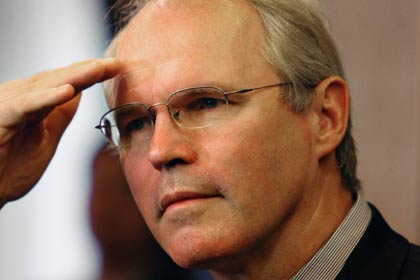Washington - The United States is bluntly warning
North Korea not to test a nuclear weapon, ratcheting up pressure on the country
to abandon its nuclear plan.

US
Assistant Secretary of State Christopher Hill gestures during a news
conference in Shanghai September 11, 2006.
[Reuters/File] |
"We are not going to live with a nuclear North Korea," Assistant Secretary
of State Christopher Hill said Wednesday, using the strongest comments by a
US official since the North triggered global concern Tuesday by announcing that it
would undertake a nuclear test.
The United States has sent a message of "deep concern" to the North through
diplomatic channels at the United Nations in New York, Hill said. He did not
elaborate on the message, except to say the North Koreans had received it and
had not yet responded.
The North Korean announcement gave no date for any test, but US
intelligence agencies are keeping close watch over activity at possible test
sites in the North.
"If they think that by exploding a weapon, that somehow we will come to terms
with it, we won't," Hill told reporters after an appearance at the Johns Hopkins
University's school of international studies. "If they think that firing off a
weapon will somehow make them a part of some sort of nuclear club, they should
think again."
The United States and North Korea have no diplomatic relations outside
deadlocked six-nation nuclear talks and rarely communicate with each other so
directly. That gives the US message a seriousness that exceeds the public
statements Washington has issued so far.
Hill would not discuss policy options, but he said senior US diplomats,
including Secretary of State Condoleezza Rice, were in steady communication with
their counterparts in Asia and Europe.
In the event of a nuclear test, Hill said, "We would have no choice but to
act and act resolutely to make sure (North Korea) understood, and make sure
every other country in the world understands, that this is a very bad mistake."
The US message to North Korea came as Washington sought to marshal a
unified diplomatic front against a possible nuclear test.
US Undersecretary of State Nicholas Burns and Japanese Vice Foreign Minister
Shotaro Yachi agreed Wednesday that if North Korea should test, international
sanctions were one of the tools both nations would expect the Security Council
to consider, a State Department official said.
Meanwhile, the United States was paying close attention to movement at
possible North Korean nuclear test sites, but authorities cautioned against
reading too much into every movement during this heightened period of interest.
A US intelligence official, speaking on condition of anonymity because of
the highly sensitive situation with North Korea, said the United States is now
seeing the movement of people, materials and automobiles and other activity
around one possible test site. But, the official said, it could be similar to
activity seen a couple of months ago. Then, no test occurred.
The official noted that international observers do not have a baseline for
comparison, because North Korea has never performed a nuclear test.
The United States has spy satellites and other eavesdropping equipment aimed
at North Korea, including ground-based seismic sensors.
At the United Nations, US Ambassador John Bolton discussed the matter with
the Security Council, State Department spokesman Tom Casey said, and the United
States would "hope to see some action there in the near future."
In Asia, North Korea's neighbors worked to forge a common front against
Pyongyang's threat. Japan, China and South Korea announced a series of summit
meetings during the next week to repair damaged ties and coordinate a strategy
for dealing with North Korea.
A US government official, who also spoke on condition of anonymity, said
Pyongyang could hold a nuclear test with little or no warning. The calculation,
the official said, is political, rather than technical, because North Korea is
believed to have such a device.
The North Korean government's public statement gave it an opportunity to
gauge what world reaction might be; US authorities are treating the statement
with seriousness and do not see it as pure bluster, the official said.
Intelligence
agencies also are considering dates for a possible test.
October 8, for example, marks the anniversary of Kim's ascension as head of
the Workers' Party of Korea in 1997. It also would coincide with the likely
approval of South Korean Foreign Minister Ban Ki-moon to become secretary
general of the United Nations. Kofi Annan steps down from the post on December
31, and the UN Security Council has set October 9 to elect his successor.